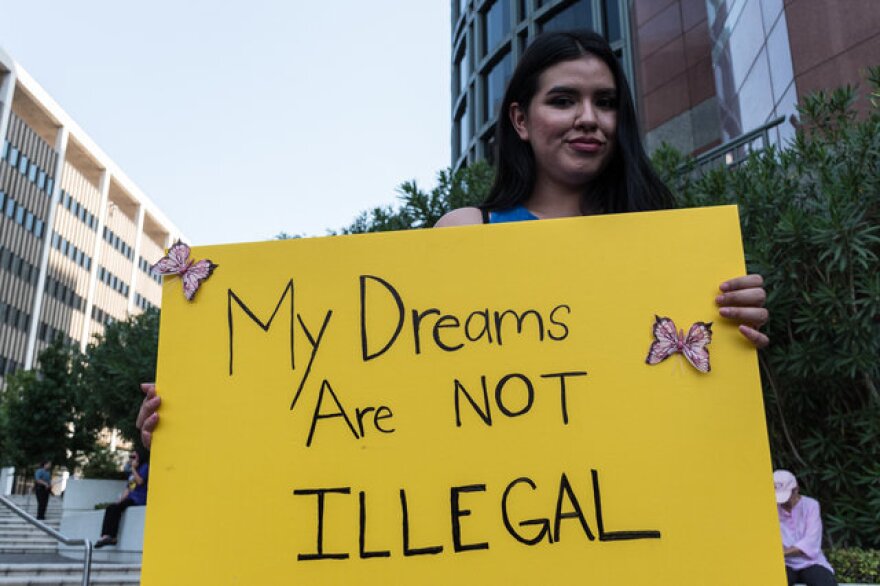This story is free to read because readers choose to support LAist. If you find value in independent local reporting, make a donation to power our newsroom today.
2,300 California ‘Dreamers’ are about to lose their health care coverage

Less than a year after “Dreamers” were first allowed to sign up for Covered California health insurance, undocumented immigrants who were brought to the U.S. as children are about to lose their health care coverage.
In California, that means about 2,300 Dreamers must find health insurance elsewhere or go without once their coverage is terminated at the end of the month. The decision was made by the federal Centers for Medicare and Medicaid Services, the agency that oversees insurance marketplaces.
Last year, the Biden administrationupdated the definition of “lawfully present” for Affordable Care Act eligibility so recipients of the Deferred Action for Childhood Arrivals program (DACA), also known as Dreamers, could buy insurance through the state and federally run marketplaces. The Trump administration reversed that decision in June and set the change to take effect two months later.
The policy is “designed to stabilize the risk pool, lower premiums, and reduce improper enrollments with a goal of improving healthcare affordability and access while maintaining fiscal responsibility,” the agency said in a statement announcing the marketplace changes.
Last week Covered California announced it was working to notify all DACA recipients that their last day of coverage will be Aug. 31 and that it will help them explore other insurance options.
Since its inception, the Affordable Care Act has barred immigrants living in the country illegally from purchasing health coverage on the marketplace. DACA recipients, who are allowed to stay and legally work in the U.S. under a 2012 program, became the exception.
'Hoped for a different outcome'
“The decision is deeply unfair to hard-working, tax-paying individuals in California who trusted that they would have health insurance for 2025, only to have it stripped away eight months later,” said Jessica Altman, the executive director at Covered California. “While we had hoped for a different outcome for DACA recipients, we must comply with federal law.”
Without the insurance marketplace, Dreamers will have to find coverage through an employer, or if their incomes are low enough, they may qualify for the state’s health insurance program for low-income people, Medi-Cal. That leaves freelancers and self-employed Dreamers, for example, in a bind if they earn too much to qualify for Medi-Cal but not enough to pay full price for a health plan.
The benefit of signing up for insurance through Covered California is accessing financial assistance. Expanding coverage to DACA recipients nationwide was estimated to cost the federal government between $240 million to $300 million a year.
Effect on the marketplace
While the federal government said the cuts are meant to stabilize the insurance risk pool and help lower premiums, experts say eliminating coverage for young people — most Dreamers are under 36 years of age — would do the opposite.
That’s because when younger and healthier people sign up for insurance, their low-cost coverage helps balance the high cost of covering individuals who are sicker and older, said Arturo Vargas Bustamante, professor at the UCLA Fielding School of Public Health.
So when fewer young people enroll in coverage, premiums tend to go up for everyone. “Then sick people who really need to get coverage pay the price,” Vargas Bustamante said.
The 13-year-old DACA program does not grant recipients legal status, but it does protect them from deportation and allows them work authorization. More than 150,000 DACA recipients are estimated to live in California.
President Joe Biden’s move to insure DACA recipients through the marketplaces was immediately met with resistance from red states. Last summer a group of 19 Republican attorneys general filed a lawsuit in federal court trying to stop the insurance marketplace expansion to DACA recipients. A federal judge in North Dakota sided with the plaintiffs and stopped the rule from going into effect in those 19 states. The new rule from the Centers for Medicare and Medicaid Services applies to all states.
DACA recipients are the first group of a larger number of immigrants who are expected to lose or drop marketplace coverage soon. The federal budget President Donald Trump approved last month eliminates marketplace financial assistance for some lawfully present immigrant groups, including refugees and asylees, starting in 2027. Without financial assistance many of these enrollees will likely not afford their coverage.
Meanwhile, everyone else enrolled in a Covered California plan could see their monthly premiums go up by $101 a month starting next year.
This article was originally published on CalMatters and was republished under the Creative Commons Attribution-NonCommercial-NoDerivatives license.
-
LAist investigates illicit dumping at three Antelope Valley sites.
-
Gary Parton has cultivated different varieties of the flower at his home, inviting the public to experience his Idyllwild Lilac Garden every year. This could be its last.
-
In an exclusive interview with LAist, Metro CEO Stephanie Wiggins said she chose Scott for his ties to L.A. and pursuit of police reform in San Francisco.
-
The light rail project, which had been planned for 2021, could see its first riders early next year.
-
Does that star-spangled banner yet wave? You bet it does, when a group of K-town retirees perform the national anthem before a Kings game.
-
Laura Rubio-Cornejo, the city of L.A.'s general manager for the transportation department, said the proposed cuts could jeopardize revenue generated by parking enforcement and implementation of Measure HLA and Vision Zero.















